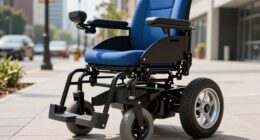Dementia encompasses a range of conditions that impact memory and cognitive abilities. You may be familiar with Alzheimer’s disease, which is responsible for the majority of dementia cases and is characterized by memory loss and confusion. Vascular dementia, on the other hand, is caused by reduced blood flow to the brain, often following a stroke, resulting in difficulties with decision-making. Other types of dementia include Lewy Body dementia, which involves hallucinations, and frontotemporal dementia, which affects personality and language. Recognizing these distinctions is crucial for providing proper care. There is much more to learn about symptoms, diagnosis, and treatment options that can help you navigate this intricate subject.
Key Takeaways
- Dementia encompasses various symptoms affecting memory, thinking, and social abilities, with Alzheimer's disease being the most common type, accounting for about 66% of cases.
- Vascular dementia arises from reduced blood flow to the brain and often leads to sudden cognitive changes, especially after strokes.
- Lewy Body dementia is characterized by visual hallucinations and fluctuating cognition due to alpha-synuclein protein deposits in the brain.
- Frontotemporal dementia primarily affects younger individuals, causing significant personality changes and language difficulties linked to abnormal protein accumulations.
- Mixed dementia combines symptoms from multiple types, complicating diagnosis and treatment, requiring tailored approaches for effective management.
Overview of Dementia

Dementia can creep up on you or a loved one, gradually impacting daily life in significant ways. It's an umbrella term that includes a range of symptoms affecting memory, thinking, and social abilities. Early signs often include memory loss, confusion, and difficulty with language. These symptoms can worsen over time, making daily activities increasingly challenging.
Individuals experiencing emotional dysregulation, similar to those with Borderline Personality Disorder, may also face challenges in coping with dementia-related changes in their lives.
Alzheimer's disease is the most prevalent form of dementia, accounting for about two-thirds of all cases worldwide. It primarily affects the brain's memory and thinking skills, leading to severe cognitive decline.
Vascular dementia, on the other hand, results from reduced blood flow to the brain, often following a stroke. This type can cause sudden changes in thinking and memory.
While these types of dementia present different symptoms, they all disrupt daily life and require careful management. Diagnosis typically involves an extensive assessment, including medical history, neurological exams, cognitive tests, and brain imaging to identify structural changes.
Understanding the nuances of these conditions helps you recognize the early signs and seek appropriate care for yourself or your loved ones.
Common Types of Dementia

When it comes to dementia, several common types can affect individuals differently, each with its unique set of symptoms and challenges.
Alzheimer's disease is the most prevalent type, accounting for about 66% of cases globally. It primarily manifests as memory problems and cognitive decline, driven by amyloid plaques and tau tangles in the brain. Understanding the importance of selecting the right care strategies and support systems is essential for managing these conditions effectively, especially as research evolves around cold medications overview that may impact overall health. Over time, the progression of Alzheimer’s can lead to significant challenges in daily functioning, making early intervention crucial. Researchers are continuously exploring effective treatments for Alzheimer’s, including therapies aimed at slowing the disease’s progression and improving quality of life for patients. Coordinating consistent care strategies with advancements in medical research ensures patients receive the most up-to-date interventions and support. As the disease progresses, caregivers play a vital role in implementing daily care routines and ensuring patients’ needs are met, particularly when mobility and communication become impaired. Staying informed about **effective treatments for Alzheimer’s** allows families and healthcare providers to collaborate on individualized care plans tailored to the patient’s evolving condition. Moreover, integrating lifestyle adjustments, such as cognitive exercises and proper nutrition, alongside these **effective treatments for Alzheimer’s** may further enhance patient outcomes and overall well-being.
Vascular dementia comes in second, often resulting from reduced blood flow due to strokes or other vascular issues. Individuals may struggle with planning, decision-making, and sudden confusion.
Another type, Lewy Body Dementia, features protein deposits that disrupt brain function, causing visual hallucinations, fluctuating cognition, and movement difficulties.
Frontotemporal dementia typically affects younger individuals and leads to significant personality changes, behavioral issues, and language difficulties.
Finally, mixed dementia is a condition where symptoms from two or more types occur simultaneously, often combining Alzheimer's and vascular dementia, complicating both diagnosis and treatment approaches.
Understanding these common types of dementia can help you or your loved ones navigate the challenges associated with each, ensuring better care and support.
Rarer Types of Dementia

About 5% of dementia cases fall under rarer types, each presenting unique challenges that can greatly impact both individuals and their families. One notable example is Creutzfeldt-Jakob Disease (CJD), a rare and rapidly progressive disease caused by prions. CJD can lead to severe cognitive decline within just a few months.
Additionally, some studies suggest that certain essential oils for cognitive support may provide complementary benefits for individuals dealing with cognitive impairments. You might also encounter atypical Alzheimer's Disease, which presents distinct symptoms that complicate diagnosis and treatment, differing from the more common type of dementia.
Young-onset dementia, occurring before age 65, highlights another challenge; it often exhibits behavioral changes rather than the classic memory loss typically seen in older patients. This can lead to misunderstandings, as loved ones may not recognize these changes as related to a dementia diagnosis.
Additionally, Huntington's Disease, a genetic disorder, manifests between the ages of 30 and 50, affecting both cognitive and motor functions.
These rarer types of dementia, including vascular dementia, underline the complexity of brain damage that can occur. Understanding these conditions is vital for providing appropriate support and care to those affected and their families.
Symptoms of Dementia

Cognitive decline manifests through a range of symptoms that can vary considerably among individuals and types of dementia. You might notice memory loss, confusion, or difficulties in language, which are common across different forms.
In understanding the cognitive challenges faced by individuals, it's vital to reflect on how the emotional impact of these symptoms can affect both the individual and their loved ones. In Alzheimer's disease, early symptoms often include repeating questions, getting lost in familiar places, and trouble recalling recent events. If you or a loved one experiences these issues, it's necessary to pay attention.
With vascular dementia, the symptoms may begin with challenges in planning and decision-making, often linked to strokes or reduced blood flow to the brain. This can lead to increased confusion and difficulties in daily tasks.
On the other hand, dementia with Lewy Bodies is marked by visual hallucinations and fluctuating attention, which can complicate diagnosis and management.
In cases of frontotemporal dementia, you might observe significant personality changes, impulsive behavior, and language difficulties, typically occurring at a younger age than other types. Recognizing these symptoms early can make a difference in seeking help and support.
Understanding the specific symptoms associated with each type of dementia is vital for managing care options effectively.
Diagnosis Process

The diagnosis process for dementia is vital in determining the best course of action for treatment and care. It typically begins with a thorough medical history assessment, where you or your family member will discuss symptoms and any relevant family history. This helps the healthcare provider understand the context of the memory and cognitive issues.
Understanding the financial implications of dementia care, such as costs associated with assisted living, can also play an important role in planning for the future financial considerations for elderly care.
Next, you'll undergo neurological exams to evaluate reflexes, coordination, and sensory functions. These exams help rule out other conditions that might mimic dementia symptoms.
Following this, cognitive tests will be administered. These standardized assessments focus on your memory, reasoning, and thinking skills, providing insight into cognitive function.
Brain imaging techniques, such as MRI or CT scans, may also be employed. These scans can identify structural changes in the brain that are associated with different types of dementia.
Additionally, blood tests might be conducted to exclude other medical issues that could be causing your symptoms and to assess your overall health.
Treatment Options

When it comes to treating dementia, managing symptoms is key to improving your loved one's quality of life.
Incorporating a balanced diet rich in fruits and vegetables can also play a role in overall brain health, as lifestyle for longevity emphasizes.
You'll find a mix of medications and non-drug therapies can help, along with supportive services for caregivers.
Understanding these options can empower you to make informed decisions for those affected by dementia.
Symptom Management Strategies
Managing dementia symptoms effectively is vital for improving the quality of life for both patients and their families. While there's no cure for conditions like Alzheimer's disease or Lewy Body Dementia, various symptom management strategies can help. As philosophical exploration encourages deeper self-reflection, it's important to recognize the individual experiences of those affected by dementia.
Medications such as cholinesterase inhibitors and memantine can alleviate some cognitive symptoms, but their effectiveness varies from person to person.
In addition to pharmacological treatments, non-pharmacological approaches play an important role in enhancing well-being. Engaging in cognitive therapies, lifestyle modifications, and stimulating activities can help maintain cognitive function and improve emotional health. These strategies not only support patients but also reduce the stress on caregivers.
It's essential to incorporate caregiver support in your overall management plan. Connecting with support groups can provide invaluable resources, tips, and emotional backing for those caring for someone with dementia.
Supportive Care Services
Here's the revised MY ARTICLE SUBHEADING CONTENT:
Numerous supportive care services are available to enhance the quality of life for individuals with dementia and their caregivers. These services focus on daily living activities and addressing emotional needs, helping you navigate this challenging journey effectively.
Additionally, understanding the emotional and psychological growth stages in individuals with dementia can aid in tailoring supportive care approaches to their unique needs, as highlighted in the key domains of development.
Here are three key types of supportive care services you might consider:
- Non-Pharmacological Therapies: Engaging in cognitive stimulation and reminiscence therapy can considerably improve mood and cognitive function for individuals with dementia.
- Medications: Cholinesterase inhibitors can be beneficial for those diagnosed with Alzheimer's, while other medications may help with mood stabilization for individuals experiencing behavioral changes.
- Community Resources: Local support groups and helplines provide essential assistance, offering connection and understanding for caregivers and families facing dementia.
With ongoing research into new treatment options, the goal is to develop more effective management strategies, leading to better outcomes for those affected.
Brain Changes in Dementia

Dementia fundamentally alters the brain's structure and function, leading to various cognitive and behavioral symptoms.
In Alzheimer's disease, for instance, the accumulation of amyloid plaques and tau tangles disrupts communication between brain cells, resulting in significant cognitive decline. This interference hampers memory and reasoning abilities, making daily tasks increasingly challenging. Understanding the importance of a budget for healthcare costs is essential for families dealing with dementia, as managing expenses can be a significant concern.
In vascular dementia, the brain suffers from impaired blood flow, often due to strokes or blood clots, which damages brain tissue. This condition can lead to sudden changes in cognitive function and difficulty in planning or executing tasks.
Lewy body dementia is another type that presents unique challenges. The deposition of alpha-synuclein proteins disrupts neurotransmitter signaling, causing fluctuations in cognition and often leading to disturbing visual hallucinations.
Frontotemporal dementia, characterized by abnormal protein accumulations such as tau and TDP-43, primarily affects the frontal and temporal lobes, causing significant personality and behavioral changes.
Understanding these specific brain changes associated with different types of dementia is essential, as ongoing research aims to reveal insights that may inform future treatment approaches for neurocognitive disorders.
Support for Caregivers

As a caregiver, you might feel overwhelmed and isolated while managing the complexities of dementia care.
It's crucial to seek out emotional support resources, participate in caregiver training programs, and connect with community support networks.
Additionally, employing strategies such as navigating partner shutdown can help facilitate better communication and understanding during challenging times.
These tools can help you gain confidence, reduce stress, and enhance your ability to care for your loved one.
Emotional Support Resources
Caring for someone with dementia can be incredibly challenging, and many caregivers find themselves feeling overwhelmed and isolated.
It's vital to seek emotional support and utilize available resources to maintain your mental health and well-being. Here are some valuable support options you can explore:
- Dementia Australia: They offer helplines and support groups, connecting you with others facing similar challenges. Sharing experiences can markedly reduce feelings of isolation.
- Respite Care Services: Taking breaks from caregiving responsibilities is essential. Respite care allows you to recharge, helping to alleviate stress and prevent burnout.
- Educational Workshops: Engaging in educational resources and workshops can enhance your understanding of dementia.
You'll learn effective communication strategies and coping techniques that can improve both your experience and that of the person you care for.
Caregiver Training Programs
When you're supporting someone with dementia, understanding the various types of the condition can greatly improve your caregiving experience. Engaging in caregiver training programs is an essential step in this journey. These programs educate you about different types of dementia, including Alzheimer's disease and vascular dementia, helping you grasp the unique challenges each presents.
You'll learn effective communication techniques that can ease interactions and reduce frustration for both you and the person you're caring for. Additionally, these programs often provide practical skills training for managing challenging behaviors, ensuring you're better equipped to handle daily situations.
Many caregiver training initiatives also offer valuable support resources, including access to online forums and local support groups. These connections foster a sense of community, where you can share experiences and advice with others in similar situations.
Research shows that trained caregivers report increased confidence and competence in their abilities, which can greatly enhance the quality of life for both you and your loved one.
Plus, many government and non-profit organizations provide free or subsidized programs, making it easier for families affected by dementia to access this essential training.
Community Support Networks
How can community support networks make a difference for caregivers of individuals with dementia?
These networks offer essential resources that can ease your journey and enhance your caregiving experience. By connecting with others who understand your challenges, you'll find emotional support and practical advice that can make a real impact.
Here are three key benefits of engaging with community support networks:
- Support Groups: Regular meetings provide a space for caregivers to share experiences, ask questions, and receive encouragement from peers who truly understand the complexities of dementia care.
- Training Programs: Many communities offer training programs that enhance your understanding of dementia, equipping you with skills that lead to better outcomes for both you and the person you care for.
- Access to Resources: Community resources like meal delivery services and transportation assistance can greatly reduce daily pressures, allowing you to focus on providing quality care.
Frequently Asked Questions
What Is the Difference Between Vascular Dementia Dementia and Alzheimer's?
Vascular dementia's caused by reduced blood flow, leading to sudden confusion and planning difficulties. Alzheimer's, however, revolves around memory loss and gradual decline. Both affect cognition differently and require distinct treatment approaches to manage symptoms.
What Is the First Symptom Most Likely to Be Seen in Vascular Dementia?
The first symptom you're likely to notice in vascular dementia is difficulty with planning, organizing, and making decisions. This executive dysfunction can lead to confusion and problems concentrating, often mistaken for normal age-related memory loss.
What Is the Life Expectancy of a Person With Vascular Dementia?
Life expectancy's largely linked to vascular variables. You might see a range of 3 to 10 years post-diagnosis, influenced by health habits, age, and comorbidities. Focus on managing those factors for better outcomes.
What Are the Four Types of Dementia?
You'll find four main types of dementia: Alzheimer's, which is the most common; vascular dementia, caused by blood flow issues; Lewy body dementia, featuring cognitive fluctuations; and frontotemporal dementia, affecting personality and behavior.
Conclusion
In understanding dementia, it's easy to feel overwhelmed by the complexity of its forms and symptoms. But remember, knowledge is power! By recognizing the signs and being aware of the different types, you're already taking a vital step toward better care and support for yourself or your loved ones. Embrace the journey of learning more about dementia, and don't hesitate to reach out for help—you're not alone in this. Together, we can navigate these challenges.









